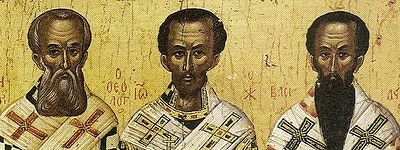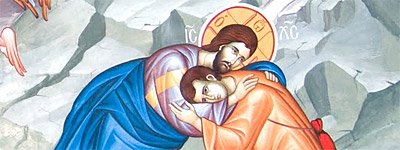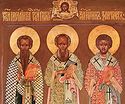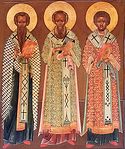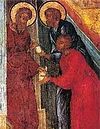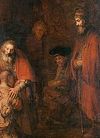 Synaxis of the Three Hierarchs: St. Basil the Great, St. Gregory the Theologian, and St. John Chrysostom.
Synaxis of the Three Hierarchs: St. Basil the Great, St. Gregory the Theologian, and St. John Chrysostom.  Hieromartyr Hippolytus, priest, of Rome, and with him Martyrs Censorinus, Sabinus, Ares, the virgin Chryse, Felix, Maximus, Herculianus, Venerius, Styracius, Mennas, Commodus, Hermes, Maurus, Eusebius, Rusticus, Monagrius, Amandinus, Olympius, Cyprus, Theodore the Tribune, the priest Maximus, the deacon Archelaus, and the bishop Cyriacus, at Ostia (3rd c.). St. Pelagia of Diveyevo, fool-for-Christ (1884).
Hieromartyr Hippolytus, priest, of Rome, and with him Martyrs Censorinus, Sabinus, Ares, the virgin Chryse, Felix, Maximus, Herculianus, Venerius, Styracius, Mennas, Commodus, Hermes, Maurus, Eusebius, Rusticus, Monagrius, Amandinus, Olympius, Cyprus, Theodore the Tribune, the priest Maximus, the deacon Archelaus, and the bishop Cyriacus, at Ostia (3rd c.). St. Pelagia of Diveyevo, fool-for-Christ (1884).
St. Zeno, hermit, of Antioch, disciple of St. Basil the Great (5th c.). Martyr Theophilus the New, on Cyprus (784). St. Peter, king of Bulgaria (967). St. Zeno the Faster, of the Kiev Caves (14th c.). St. Theophil, fool-for-Christ, of Svyatogorsk Monastery (1868). Synaxis of the Saints of Perm.
“Tinos” Icon of the Most Holy Theotokos.
St. Adelgonda, foundress of Maubeuge (Neth.) (680). St. Bathilde, queen of France (680). New Martyr Hadji Theodore of Mytilene (Mt. Athos) (1784). New Martyr Demetrius of Sliven (1841).
Sunday of the Prodigal Son (34th). [I Cor. 6:12–20;
Luke 15:11–32]
The week of the prodigal speaks of so much to us! It
speaks about our peace and satisfaction in the house of
the heavenly Father, about our mad departure from the
Father’s guardianship to unbridled freedom, about
the richness of the heritage given us despite our
disobedience, about its reckless waste on all sorts of
indecencies, and about our utter impoverishment as a
result. But then it talks also about how one recovers his
senses, and, coming to himself, decides to return to his
greatly merciful Father. It talks about how he returns,
how he is received lovingly, and is restored to his first
state. Who will not find this lesson profitable? If you
abide in your father’s house, do not strive for
freedom. You see how a similar experience ended! If you
have run away and are squandering all, end this quickly.
If you have already squandered everything and are living
in poverty, decide quickly to return—and then,
return. There every indulgence, and all the former love
and satisfaction, await you. This last step is the most
necessary one. But there is no point in enlarging upon
this. All has been said concisely and clearly. Come to
your senses, decide to return, arise and hurry to the
Father. His embrace is open and ready to receive you.


![]() Synaxis of the Three Hierarchs: St. Basil the Great, St. Gregory the Theologian, and St. John Chrysostom.
Synaxis of the Three Hierarchs: St. Basil the Great, St. Gregory the Theologian, and St. John Chrysostom. ![]() Hieromartyr Hippolytus, priest, of Rome, and with him Martyrs Censorinus, Sabinus, Ares, the virgin Chryse, Felix, Maximus, Herculianus, Venerius, Styracius, Mennas, Commodus, Hermes, Maurus, Eusebius, Rusticus, Monagrius, Amandinus, Olympius, Cyprus, Theodore the Tribune, the priest Maximus, the deacon Archelaus, and the bishop Cyriacus, at Ostia (3rd c.). St. Pelagia of Diveyevo, fool-for-Christ (1884).
Hieromartyr Hippolytus, priest, of Rome, and with him Martyrs Censorinus, Sabinus, Ares, the virgin Chryse, Felix, Maximus, Herculianus, Venerius, Styracius, Mennas, Commodus, Hermes, Maurus, Eusebius, Rusticus, Monagrius, Amandinus, Olympius, Cyprus, Theodore the Tribune, the priest Maximus, the deacon Archelaus, and the bishop Cyriacus, at Ostia (3rd c.). St. Pelagia of Diveyevo, fool-for-Christ (1884). 
